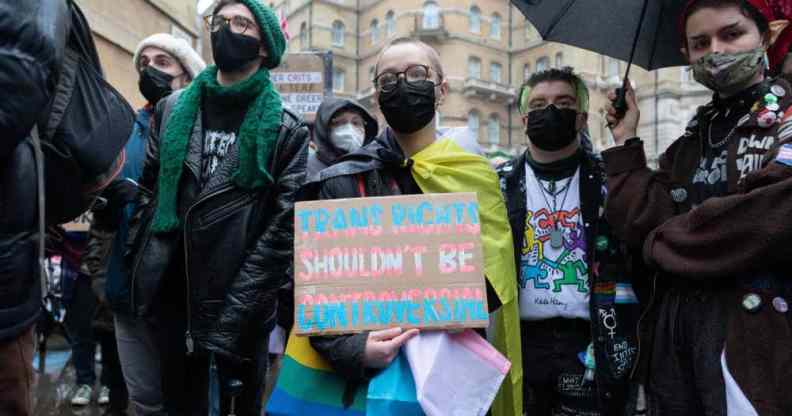Trans people ‘ridiculed and hurt’ as UK government fails to reform gender laws, parliament hears

A protestor seen holding a placard that says ‘Trans rights shouldn’t be controversial’ during a demonstration. (Belinda Jiao/SOPA Images/LightRocket via Getty)
MPs have slammed the spread of “discrimination and hatred” towards the trans community in media reports during a debate on the UK’s Gender Recognition Act (GRA).
Several MPs gathered on Monday (21 February) to debate a petition relating to the reform of the GRA. The petition, which has more than 137,000 signatures, called for reform to the GRA to allow trans people to “self-identify without the need for a medical diagnosis, to streamline the administrative process and to allow non-binary identities to be legally recognised”.
During the debate, Labour and Co-operative Party MP Stephen Doughty spoke out against the “conduct of a number of newspapers” and other outlets that have reported on trans stories in the UK.
Doughty shared that he had visited the Bishopsgate Institute’s archive of LGBT+ materials, which included thousands of press cuttings preserving the history of the queer community.
He said he was struck by how the headlines from the past – which detailed the discrimination and hatred toward the LGBT+ community – were similar to those in the more recent past.
“I was looking back at some of the headlines and stories from the past, and the discrimination and hatred that was directed against other members of the LGBT+ community,” Doughty said. “We see that reflected again today in similar headlines, myths and mistakes.”
He continued: “One of the biggest problems is that there is not a courteous and respectful debate about the technical and legal issues, but rather one driven to ridicule, hurt or actively undermine the position of people who exist, are living their lives, and simply want to get on with their lives with dignity and respect.”
Doughty told MPs that he had trans and non-binary constituents call him “in tears about the latest headline that they have seen in the newspaper” or over an “abusive row on Twitter or social media”.
Lesbian Labour MP Dame Angela Eagle echoed this sentiment and said there has been an “othering of trans people” similar to hateful tropes directed at LGBT+ people in the 80s.
“We have seen the othering of trans people, with tropes now appearing about what trans people are – that they are a danger,” she said. “I remember the same tropes being directed at LGBT+ people in the 1980s: ‘You can’t trust them around children’, ‘They’re weird’, and ‘They are violent and a threat’.”
Since the 2018 consultation on reform of the Gender Recognition Act, the Government has failed to take action on this overly medicalised and stigmatising process. Delays hurt the trans community, and the Government must act now to stop us lagging behind the rest of the world pic.twitter.com/PjIgcZoLyI
— Angela Eagle DBE (@angelaeagle) February 21, 2022
While this has happened, Eagle said trans people have been “kept on tenterhooks” waiting for the government to act, and there have been increased attacks on the trans community.
Several MPs pointed out that trans voices were noticeably absent during the GRA debate.
Liberal Democrat MP Layla Moran used the time she had during the debate to share the “voices of trans people and their families” on the issue.
She contacted some of her constituents in Oxford West and Abingdon on what they would like MPs to hear, and she read aloud the passionate testimony of a mother concerned for trans children in the UK.
Moran said: “The first, a mother of a trans child, said: ‘The bullying and harassment my child suffered at school took over our lives for a year and a half.
“‘I was constantly attending hearings, talking to the school, and making arrangements to move schools.
“‘But I would have gone to any lengths necessary to protect my child. I have a background in education and knew what I could do to make the school listen’.”
Moran said the mother was worried that there are young trans people who lack a support network and that the current legislation meant that trans youth have “no legal protection from being outed or harassed”. The mother told the MP that she didn’t understand “what good reason anyone could have for failing to protect a vulnerable minority this way”.
Another constituent, a trans woman, told Moran that she knew she was trans from a young age, but she hid her truth from the world because she grew up during Section 28. The woman shared that she still doesn’t have a Gender Recognition Certificate because the “bureaucracy, money, and invasiveness are significant barriers”.
The woman pleaded with the government to “listen to the trans community” and quickly reform the Gender Recognition Act as the delay had a severe impact on trans youth in the UK.
Gender Recognition Act reform has been delayed because of ‘disinformation, radicalisation and the rollback of LGBT+ rights’
SNP MP Mhairi Black declared that Gender Recognition Act reform has been delayed because it has become a “breeding ground of disinformation, radicalisation and the rollback of already established LGBT+ rights”.
“The rest of the world is watching right now as Britain is in the full grasp of a moral panic,” Black said. “The fact that Britain has been internationally identified as having a problem with transphobia has not come out of thin air.”
The current Gender Recognition process is deeply invasive, traumatising, unnecessary, and dehumanising. It’s time to get reform done. pic.twitter.com/A70kFJWMT2— Mhairi Black MP?️? (@MhairiBlack) February 21, 2022
She added that legislators have a “responsibility to educate ourselves” about issues impacting the trans community. But Black said MPs have “allowed disinformation and confusion to run rife”, creating an “environment that allows transphobia and ignorance to thrive”.

